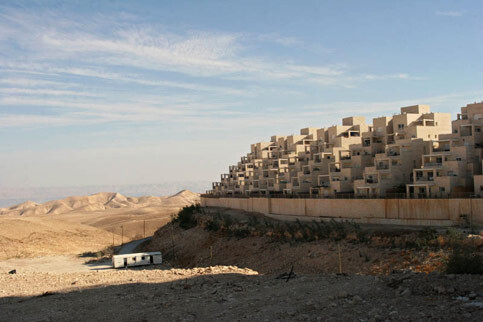The Electronic Intifada 9 December 2009

The Maale Adumim settlement in the occupied West Bank. (ActiveStills)
Last month, the second-largest Dutch pension fund PFZW joined an already impressive group of investors that have divested from Africa-Israel. Africa-Israel is the target of an international boycott campaign by Palestine solidarity activists because of its involvement in the construction of illegal Israeli settlements in the occupied West Bank.
The negative publicity around Africa-Israel’s involvement in the settlements hit at the same time that the global financial crisis led to a depreciation of Africa-Israel’s real estate assets and forced its owner, diamond mogul Lev Leviev, to sell 20 percent of his shares in the company. On 30 November, the Israeli business magazine Globes Online reported that the Israeli Bank Hapoalim, Leviev’s largest creditor, made a provision of NIS 300 million ($78.8 million) for doubtful debt (debts a creditor does not expect to be paid off) related to Africa-Israel. In addition, Memorand Management Ltd., the private company owned by Leviev, owes Bank Hapoalim NIS 2 billion ($525.5 million).
Bank Hapoalim, which is involved in illegal settlement activities, has also been affected by the global financial crisis. It made the provision for doubtful debt because it does not expect Africa-Israel or Leviev to be able to pay off their debts.
Africa-Israel Investment is an Israeli international holding and investment company whose subsidiary, Danya Cebus, executed construction projects in the Israeli settlements of Modiin Illit, Maale Adumim, Har Homa and Adam. In addition, the company offers apartments and houses in various settlements in the West Bank through Anglo Saxon, the Israeli franchise of its real estate agency. Israeli settlements in the West Bank are illegal under international law, and this status has been confirmed by numerous UN resolutions and the authoritative 2004 advisory opinion of the International Court of Justice on Israel’s wall in the occupied West Bank.
Africa-Israel’s involvement in illegal settlement activities in the West Bank exposed the company and its founder to a serious backlash from institutional investors and consumers. The company’s problems began when the United Nations Children’s Fund (UNICEF) broke its ties with Leviev and refused to accept his donations in June 2008.
A year later, the British government joined UNICEF. In March 2009, Ambassador Tom Phillips decided not to move the British embassy in Tel Aviv to Africa-Israel’s Kirya Tower. The decision was influenced by warnings from a British attorney after advocate Daniel Machover argued that renting space from the company was tantamount to the government condoning Israel’s settlement-building, supporting clear violations of international law and hindering the possibility of peace in the Middle East.
A few months later BlackRock, one of the world’s largest investment management firms, was pressured by Scandinavian investors to determine if its investments in Africa-Israel were consistent with the firm’s principles of ethical and responsible investments. On 23 August Globes Online reported that BlackRock divested from Africa-Israel.
BlackRock was joined by the US Teachers Insurance and Annuity Association College Retirement Equities Fund, Swedish Investeringsforeningen Sydinvest, Swedish AP1 pension fund and Dutch PFZW (formerly known as PGGM). Although these funds divested from Africa-Israel, none of them have revealed publicly why they made the decision to do so.
The divestments coupled with the collapse in the financial and real estate markets were disastrous for Africa-Israel and its celebrity owner. On 31 August Leviev announced at a press conference he was unable to repay debts of nearly 1.4 billion euros ($2.11 billion) on time. In a settlement with Africa-Israel’s bondholders and banks Leviev agreed to issue shares to raise NIS 750 million ($198 million) to cover debts to his creditors. As a result, Leviev’s share in Africa-Israel dropped from 75 percent to 52.8 percent.
Yet the financial crisis was not solely responsible for the problems Africa-Israel and Leviev have encountered. Shir Hever, a political economy researcher at the Alternative Information Center (AIC), argues that the boycott movement by international solidarity activists played a key role in toppling Africa-Israel. Other Israeli tycoons with much higher debts were confronted with the same financial crisis. But as Hever wrote in article published by AIC on 2 September, the boycott “destroyed Africa-Israel’s image along with its fortunes, and because investors were wary of lending money to a company beset by protest, and facing possible litigation for crimes committed in the [Occupied Palestinian Territory].”
In spite of the divestment trend there are still some surprising funds invested in Africa-Israel. For example, the Norwegian State Pension Fund-Global which divested from Elbit, one of the largest Israeli security and defense firms, is reluctant to divest from Africa-Israel. Although the pension was hailed for its divestment from Elbit, it continues to invest in a company that facilitates settlement construction in open violation of international law. Perhaps morality is not the issue and the pension fund like other investors will only begin to question its relationship with Africa-Israel when investments in the company are no longer profitable. Based on the company’s performance over the past year, Africa-Israel’s day of reckoning is coming faster than anyone, especially Lev Leviev, expected.
Adri Nieuwhof is an independent consultant based in Switzerland.




